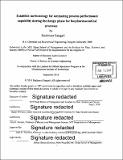| dc.contributor.advisor | Roy E. Welsch and Daniel Whitney. | en_US |
| dc.contributor.author | Sangari, Rashmeet | en_US |
| dc.contributor.other | Leaders for Global Operations Program. | en_US |
| dc.date.accessioned | 2017-01-30T19:16:42Z | |
| dc.date.available | 2017-01-30T19:16:42Z | |
| dc.date.copyright | 2016 | en_US |
| dc.date.issued | 2016 | en_US |
| dc.identifier.uri | http://hdl.handle.net/1721.1/106751 | |
| dc.description | Thesis: M.B.A., Massachusetts Institute of Technology, Sloan School of Management, 2016. In conjunction with the Leaders for Global Operations Program at MIT. | en_US |
| dc.description | Thesis: S.M. in Systems Engineering, Massachusetts Institute of Technology, School of Engineering, Institute for Data, Systems, and Society, 2016. In conjunction with the Leaders for Global Operations Program at MIT. | en_US |
| dc.description | Cataloged from PDF version of thesis. | en_US |
| dc.description | Includes bibliographical references (pages 89-92). | en_US |
| dc.description.abstract | It is highly desirable to apply a systematic methodology in order to measure, improve and ensure robust process performance during process development (PD) for biopharmaceutical processes. Designing a standardized approach to leverage process performance capability or Ppk during the process design phase will enable processes to consistently meet pre-defined targets for performance and facilitate continuous improvement. The project goal is to define the criteria, which includes recommendations on optimal sample sizes, techniques to account for measurement variation, and options to leverage platform variation knowledge, for determining Ppk during process design of a biopharmaceutical product. This can be especially challenging to ascertain in early phase for biopharmaceutical processes due to low sample sizes and long product cycle times. The scope of this project includes performance measurements in drug substance manufacturing from unit operations: vial thaw to final drug substance formulation. The assessment begins with selection of an upstream or downstream process parameter followed by evaluation of variation due to the analytical method and concludes with the determination of optimal sample size and appropriate next steps. A novel decision matrix using Intraclass Correlation Coefficient (ICC) and Precision to Tolerance (P/T) ratios is being recommended to determine the method variation. A procedure has also been designed to filter out method variation to calculate the Ppk of only the process. Additionally, the effect of sample size on Ppk has been established. Based on the results from bootstrapping, a multi-tiered approach taking into account the differing complexity of parameters to estimate Ppk at small sample sizes is being recommended. To elaborate, sample sizes greater than 11 independent batches typically provide sufficient confidence in Ppk estimates. Sample sizes from 8 to 11 batches will require uncertainty to be evaluated along with Ppk calculation, due to the width of confidence intervals. For sample sizes less than 8, the confidence intervals for the Ppk statistic are too large and not reliable. In this scenario, Bayesian analysis, a powerful tool for prediction of data, is conducted using data from other scales and molecules as historical database to estimate Ppk and the credible interval around it. | en_US |
| dc.description.statementofresponsibility | by Rashmeet Sangari. | en_US |
| dc.format.extent | 92 pages | en_US |
| dc.language.iso | eng | en_US |
| dc.publisher | Massachusetts Institute of Technology | en_US |
| dc.rights | MIT theses are protected by copyright. They may be viewed, downloaded, or printed from this source but further reproduction or distribution in any format is prohibited without written permission. | en_US |
| dc.rights.uri | http://dspace.mit.edu/handle/1721.1/7582 | en_US |
| dc.subject | Sloan School of Management. | en_US |
| dc.subject | Institute for Data, Systems, and Society. | en_US |
| dc.subject | Engineering Systems Division. | en_US |
| dc.subject | Leaders for Global Operations Program. | en_US |
| dc.title | Establish methodology for estimating process performance capability during the design phase for biopharmaceutical processes | en_US |
| dc.title.alternative | Establish methodology for estimating Ppk during the design phase for biopharmaceutical processes | en_US |
| dc.type | Thesis | en_US |
| dc.description.degree | M.B.A. | en_US |
| dc.description.degree | S.M. in Systems Engineering | en_US |
| dc.contributor.department | Leaders for Global Operations Program at MIT | en_US |
| dc.contributor.department | Massachusetts Institute of Technology. Engineering Systems Division | |
| dc.contributor.department | Massachusetts Institute of Technology. Institute for Data, Systems, and Society | |
| dc.contributor.department | Sloan School of Management | |
| dc.identifier.oclc | 969448598 | en_US |
